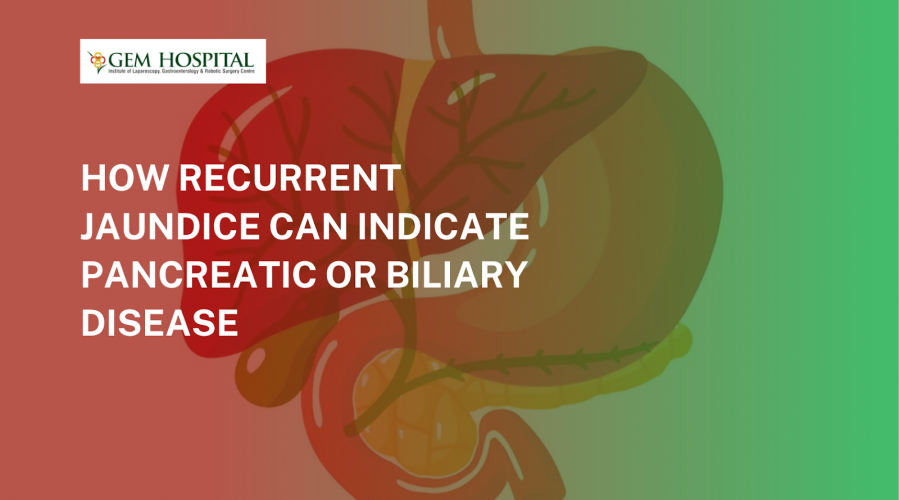Consult experienced hernia doctors in Chennai for expert surgical care. Advanced diagnosis, safe hernia surgery, and faster recovery with specialized treatment.
How Recurrent Jaundice Can Indicate Pancreatic or Biliary Disease

A condition called jaundice often surprises people because it consists of a yellowing of the skin and eyes and indicates that something is wrong with the body. Often jaundice is associated with liver disease. However, when someone has recurrent jaundice, that is, jaundice that returns time and time again it should never be considered just another product of the liver. Instead, recurrent jaundice can be a major warning sign of something more serious that is involved with the pancreas or biliary system.
In this blog, I will discuss how Recurrent Jaundice and Pancreatic Disease are related, what the biliary disorders provide, and the importance of investigating and treating these problems early.
Understanding Jaundice and Its Causes
Jaundice occurs when bilirubin, a yellow pigment, is allowed to accumulate in the blood and the tissues. Bilirubin is formed when old red blood cells naturally degrade. It releases bilirubin in blood, which typically flows to the liver and is excreted in bile into the intestines. If there is a disruption in this cycle, bilirubin will continue to increase in the blood, underlying the yellow colour associated with jaundice.
Common causes of jaundice include:
- Liver disease (hepatitis, cirrhosis)
- Hemolysis (excessive breakdown of red blood cells)
- Obstruction of bile flow (due to gallstones, strictures, or tumors)
When jaundice becomes recurrent, particularly after the liver function has normalized, it raises concerns about other underlying conditions most notably those affecting the pancreas and biliary system.
The Link Between Recurrent Jaundice and Pancreatic Disease
The pancreas resides within an area closely approximating the bile ducts. When the pancreas is diseased through inflammation, cyst formation, or cancer, it may compress or infiltrate the bile ducts, obstructing the flow of bile, resulting in obstructive jaundice.
In this scenario, recurrent jaundice is of particular concern because it infers a mechanical obstruction that waxes and wanes:
- A tumor may intermittently block the bile duct.
- Inflammatory swelling in pancreatitis may temporarily obstruct bile flow.
- Cysts or strictures may create partial blockages that fluctuate.
If left unchecked, Recurrent Jaundice and Pancreatic Disease can result in complications such as:
- Progressive liver damage
- Cholangitis (bile duct infection)
- Malnutrition and weight loss
- Metastasis (in the case of pancreatic cancer)
Conditions of the Pancreas That Can Cause Recurrent Jaundice
- Pancreatic Cancer
The most feared cause of biliary obstruction is cancer in the head of the pancreas that is compressing the common bile duct. Jaundice is often one of the first symptoms to present. Recurrent jaundice may develop if the tumor grows, or the cause is temporarily relieved without resolution (for example, stent placement).. - Chronic Pancreatitis
In long-standing and chronic inflammation in the pancreas, there is swelling and scar formation that can cause intermittent obstruction of the bile duct. Patients with chronic pancreatitis may experience waxing and waning jaundice. - Pancreatic Cysts
Some pancreatic cysts, particularly mucinous cystic neoplasms and intraductal papillary mucinous neoplasms (IPMN), can obstruct bile ducts. Recurrent jaundice could indicate cyst growth or malignant transformation in these scenarios.
Biliary Disease and Its Role in Recurrent Jaundice
Common Biliary Causes of Recurrent Jaundice
Little doubt that biliary disease is another important source of recurrent jaundice besides the pancreas. Biliary causes of recurrent jaundice include:
- Gallstones (Choledocholithiasis)
Gallstones can migrate to the common bile duct, and ultimately cause intermittent biliary obstruction. Patients with gallstones may exhibit episodic reversible speculum, which dissipates when the stone subsequently passes into the intestine, and then the cycle repeats when new gallstones form.
- Bile Duct Strictures
Bile duct strictures due to prior surgery, inflammatory disease or trauma, can produce ongoing partial or intermittent obstructive disease, resulting in recurrent jaundice.
- Cholangiocarcinoma (Bile Duct Cancer)
Like pancreatic cancer, cholangiocarcinoma will result in either progressive or intermittent jaundice due to tumoral invasion into hepatobiliary structures.
- Primary Sclerosing Cholangitis (PSC)
PSC is a bile duct dysplasia disease, resulting in strictures with intermittent obstruction, which...can be a source of on-going recurrent jaundice.
Key Symptoms to Watch For
If you or a loved one is experiencing recurrent jaundice, it is important to pay attention to accompanying symptoms that may indicate a serious underlying cause:
- Abdominal pain, particularly in the upper abdomen or back
- Unintended weight loss
- Loss of appetite
- Dark urine and pale stools
- Itching of the skin
- Fever and chills (suggestive of cholangitis)
Diagnostic Approach
A thorough evaluation is essential to determine whether Recurrent Jaundice and Pancreatic Disease are linked in your case, or whether biliary disease is the primary issue. A typical diagnostic pathway includes:
- Blood tests (liver function tests, bilirubin levels, tumor markers)
- Ultrasound of the abdomen
- CT scan or MRI/MRCP for detailed visualization of the pancreas and bile ducts
- Endoscopic ultrasound (EUS) or ERCP for tissue diagnosis and therapeutic interventions
Early detection is key especially when malignancy is a possibility.
Don’t Ignore Recurrent Jaundice
Recurrent jaundice can certainly raise red flags for serious pancreatic disease or biliary obstruction both of which warrant urgent care. Even if there is a history of resolving jaundice, the episodes of repeated jaundice warrant an investigation.
At Gem Hospital, we have experienced gastroenterologists, hepatobiliary surgeons, and pancreatic specialists, with a full complement of diagnostic and therapeutic capabilities to identify and treat the underlying issues that cause recurrent jaundice.
If you or someone you care about has recurrent jaundice, don’t wait.
Contact Gem Hospital today to schedule your appointment.
Your health deserves nothing less. Let us help you keep it that way.
Blogs & Article
Get advanced liver transplant treatment in Chennai with expert surgeons, modern technology, and comprehensive care for safe and successful outcomes.
Get advanced piles treatment in Erode with expert doctors. Safe procedures, modern technology, and effective care for fast relief and recovery.


